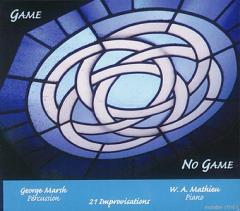GEORGE MARSH & W. A. MATHIEU / Game / No Game
George Marsh (percussion); W. A. Mathieu (piano)
"The album's 21 tracks... generate engaging soundscapes that transcend the sublime feeling of rapture that possesses the improviser, and translate as a priced slice of sonic ravishment." - Marco Rivera, Splendid
When George and I play together we tend to hear compositionally, that is, we try to weave coherent stories told through musical ideas. Surface texture, which is like the atmosphere of a story, does arise, of course, but strictly musical ideas drive the narrative from the inside. This means remembering (as best we can) what we've been playing. Consequently the pieces are short, typically three or four minutes.
Viola Spolin characterized the original theater games she introduced as "…a timeless moment when all are mutually engaged in experience. You don't know what's going to happen, and that's where the joy is, the everlasting spiral." In the 1950s, as theater games emerged in the culture, artists were learning a new definition of the present, which seemed limitless and beckoning.
In 1959 I became the musical director of The Second City Theater's founding company. As part of our training program, under Viola's watchful eye, we developed theater games designed to musicalize the actors' perceptions. Mutual trust was the key. When George and I met in 1964, we began to invent musical games to guide us through the uncharted territory of free music. As we discovered our musical kinship, we found two other like-minded players (Rich Fudoli, winds, and Clyde Flowers, bass). As the Chicago Improvising Players, we developed a repertoire of games arranged in series and performed as Game Symphonies.
I joined San Francisco's Committee Theater in 1967, where theater games were already a flourishing source of discipline and inspiration. The San Francisco Conservatory hired me to teach improvisation as a required course. Clyde and George moved to the Bay Area in 1968, and we three became the core trio of The Ghost Opera Company, featuring gifted students in the Conservatory and many guests from around town, including actors from The Committee.
By 1970, free improvisation was in the air, and game playing was well on its way to becoming a standard training method for both actors and musicians internationally. Meanwhile George and I have had four decades of collaboration to develop our work and trust. Game/No Game, recorded between 1999 and 2002, represents not so much the games themselves as their end result: the musical mutuality that games engender. - W. A. Mathieu
TRACK LIST
Improvisation 1 (2:23)
Improvisation 2 (2:59)
Improvisation 3 (2:35)
Improvisation 4 (2:48)
Improvisation 5 (6:09)
Improvisation 6 (2:52)
Improvisation 7 (3:53)
Improvisation 8 (3:25)
Improvisation 9 (3:11)
Improvisation 10 (5:09)
Improvisation 11 (2:06)
Improvisation 12 (4:13)
Improvisation 13 (1:36)
Improvisation 14 (3:21)
Improvisation 15 (2:26)
Improvisation 16 (2:07)
Improvisation 17 (1:33)
Improvisation 18 (2:24)
Improvisation 19 (2:41)
Improvisation 20 (3:11)
Improvisation 21 (2:42)
REVIEWS
As pioneers in the consolidation of improv scenes in Chicago and San Francisco during the early sixties, percussion extraordinaire George Marsh and pianist W.A. Mathieu can take pride in their unquestionable O.G. status. Games/No Games takes its name and basic concept from the experimental methodology developed by free music movement originators as a way to explore and systematize the open, inviting possibilities of improvisation. Borrowed/adapted from drama techniques, these "games" are non-restrictive sets of basic conditions and instructions, devised to allow the flow of musical creativity to manifest itself. La Monte Young's famed Composition 1960 No. 10, which consisted of nothing but the instruction, "Draw a straight line and follow it", is the most extreme example of the unexpected situations that can be produced by this approach. An intense, close, almost telepathic level of musical communication can be achieved, reaching such levels of anticipation that the results become an expression of -- to quote Mathieu's excessively exhaustive liner notes, which inconveniently demystify the music-making process -- a Zen-like ability to "hear compositionally". When it comes to improvisation, however, artistic can turn autistic, and what the musicians experience as a mystical communion of subtlety and transparent lucidity faces the risk of reaching the listener as solipsism and mindlessness. The album's 21 tracks, most of which are three or four minutes long (because the musicians need to remember what they have been playing as their sessions ebb and flow), generate engaging soundscapes that transcend the sublime feeling of rapture that possesses the improviser, and translate as a priced slice of sonic ravishment. They can actually reach the listener, inviting him/her to witness how self-expression dissolves into a collective mind and sound starts "playing" the musicians. And all of this happens as the duo's output goes beyond the superficial appearance of gratuitous, aimless noodling that people usually associate with this kind of demanding music. Some of these games involve extreme musical economy (the one called "Sparse As Possible"), trading leadership without a visual cue ("Who Leads") or establishing non-metered pulses ("Pulse"). The most successful cuts are those based on the "Just Play" technique ("5" and "20", for example): no pre-conceptions or pre-arrangements are set, and music erupts from wakefulness. That's the most beautiful option of all: the game of no game. Consider it a challenge to our ego-driven, linear narrative-addicted listening patterns.

